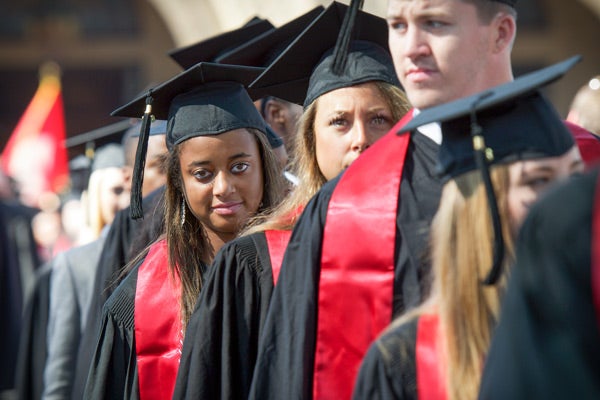|
January 11, 2013
Stanford report says college degree is an advantage during the recession
The recession cost four-year graduates fewer jobs and pay cuts than those with two-year degrees or high school diplomas. By Paul Gabrielsen

In the 2007-09 recession, college graduates fared better in terms of employment and wages than their less-educated counterparts, according to a study by the Stanford Center on Poverty and Inequality. (Photo: Linda A. Cicero / Stanford News Service)
Good news, grads. College is still worth it.
A new study by the Stanford Center on Poverty and Inequality shows that among 21- to 24-year-olds, those with a four-year college degree fared better in the Great Recession than those with less education.
The recession did hit newly minted college grads hard. But it hit those with less education even harder.
This study is the first to specifically examine recent graduates, said lead author David Grusky, a professor of sociology and director of the Center on Poverty and Inequality. Grusky's team compared 21- to 24-year-old graduates, classifying them by their highest credential received: a high school diploma, two-year college degree or four-year degree.
Grusky's team used data from the U.S. Census Bureau's Current Population Survey, an ongoing, nationwide labor statistics survey. The study, released Wednesday, was funded by the Pew Charitable Trusts' Economic Mobility Project.
Grusky's results provide hope against a backdrop of discouraging media stories, including those last spring reporting that half of college graduates couldn't find a job.
"What we show to the contrary is that recent college graduates are relatively protected. They have undergone all sorts of damaging hits in the recession like every group, but the damage is not as severe as the case of the less educated," Grusky said.
Grusky's study compared employment data before, during and after the 2007-09 recession. By 2011, the percentage of employed high school diploma holders was 15 percent lower than in 2003. For four-year degree holders, though, the drop was only 7 percent.
Wages also dropped during the recession, but more severely for groups with less education. The average weekly wage for a four-year degree holder went down by 5 percent during the recession while high school diploma holders' paychecks went down by 10 percent.
On a related issue, the study found no evidence that the unemployed were returning to school in droves. Instead, Grusky's team showed that the proportion of unemployed 21- to 24-year-olds enrolled in school dipped a few percentage points during the recession.
Education helped unemployed workers re-enter the workforce. Unemployed college-educated workers had about the same success rate finding jobs both before and after the recession. Workers with less education weren't as fortunate: Their rates of workforce re-entry dropped by 10 percent by the end of the recession.
Grusky emphasized that these trends are relative and don't suggest that a college degree provides total immunity from economic downturn.
"There has been a slight decline in their wages. There is some evidence of them accepting jobs that are of lower status. All these bad things are happening for them. It's just that even worse things are happening for groups that have lesser credentials," he said.
The Stanford Center on Poverty and Inequality is one of three national poverty centers committed to studying sociological trends related to poverty and economic indicators.
Paul Gabrielsen is an intern at the Stanford News Service.
-30-
|